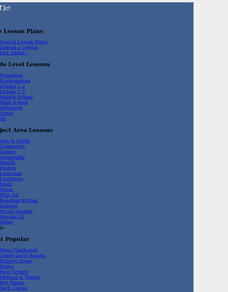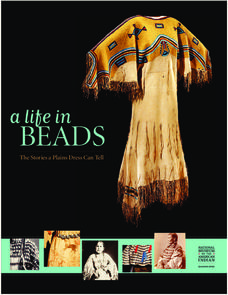Curated OER
The Lewis and Clark Expedition
Students examine the Lewis and Clark expedition. They develop skills for historical analysis. They locate a variety of geographic features encountered by the expedition, and create a timeline that documents Lewis and Clark on their journey.
Curated OER
Lewis and Clark: Meeting the Indians of the Northwest
Eighth graders examine the relationships forged with Native Americans by Lewis and Clark. In this Westward Expansion lesson, 8th graders research digital and print sources to study details regarding the Native American tribes that Lewis...
Curated OER
Worksheet-Bonding
For this bonding and electron configuration worksheet, students answer 9 multi-part questions including identifying the differences between bond types, drawing Lewis structures for atoms and identifying types of bonds in molecules.
Curated OER
Why and How Atoms Combine
Here is a top-notch handout to supply your chemistry class with. It covers valence electrons, Lewis diagrams, the octet rule, and more! Technically it is less of a worksheet than a detailed explanation of these chemical bonding concepts....
Curated OER
Lewis & Clark Map
In this Lewis and Clark expedition map worksheet, students examine the route of the expedition and the separate return routes of both Lewis and Clark.
Curated OER
How Do Atoms Stick Together?
In this chemical bonding activity, learners answer 10 questions about ionic bonding, covalent bonding, metallic bonding, Lewis structures, and intermolecular forces.
Curated OER
Bonding Basics Review
In this bonding learning exercise, students complete a chart of elements, their symbols, the total number of electrons, the number of valence electrons and the oxidation numbers. They draw Lewis structures for atoms and show the transfer...
Curated OER
How Do Atoms Stick Together?
In this chemical bonding worksheet, learners answer 76 questions about compounds, Lewis dot structures, intermolecular forces between atoms, electronegativity and bonding and types of bonds.
K12 Reader
Jabberwocky
Readers demonstrate their ability to use word endings and word relationships to identify the parts of speech of the nonsense words in Lewis Carroll's "Jabberwocky."
Science Geek
Valence Electrons
There is a lot of negativity when studying electrons, but this presentation makes the experience more positive by beginning with the definition of a valence electron and breaking down the number of valence electrons by groups on the...
T. Trimpe
Atomic Basics
Get down to basics with these worksheets on the structure of atoms. Challenging young chemists to identify information from the periodic table and create Bohr diagrams and Lewis dot structures for different elements, this resource would...
Curated OER
Picture it!
Students practice the skill of visualization to process the benefits of reading text without pictures. They must master visualizing in their minds what the words are stating on the pages of a text. Each student receives a copy of "The...
Curated OER
Chemistry 1A Review
For this Chemistry 1A worksheet, students review, molecular weight, solubility, endothermic reactions, and number of protons, neutrons, and electrons for elements. Students review Lewis Structures and how to predict the amount of product...
Curated OER
Bonding Basics Practice Page
In this chemistry worksheet, students complete each of the bonds listed. They draw the Lewis structures for each atom and show the transfer of electrons and charge for each ion. Students also draw the Lewis structures for each atom and...
Curated OER
The Louisiana Purchase: Worksheet
Celebrate the anniversary of one of the United States' most important land acquisitions with a fun worksheet. The class answers five matching questions related to those involved with the Louisiana Purchase and then think about what life...
Smithsonian Institution
A Life in Beads: The Stories a Plains Dress Can Tell
Young learners discover how the Sioux and Assiniboine tribes preserved native culture through the making of traditional dresses, identifying the resources used to make the dresses and discussing behind the meaning behind some American...
Curated OER
Extending the Acid/Base Concept
In this acid and base worksheet, students answer 4 questions about the definitions of acids and bases. They illustrate the differences between Arrhenius and Bronsted acids and bases and draw Lewis diagrams for the formation of compounds...
Humanities Texas
A President's Vision: Thomas Jefferson
Here you'll find a fantastic resource for analyzing several primary sources regarding Thomas Jefferson's presidency, from his election and home in Monticello to the Lewis and Clark expedition and the Louisiana Purchase.
Curated OER
Metals vs. Non-Metals
In this elements worksheet, students compare and contrast the characteristics of metals and non-metals. Students practice drawing Lewis dot diagrams and writing ion notation. This worksheet has 9 word problems, 8 matching questions, and...
Curated OER
IPC Chemistry Review
In this chemistry review activity, high schoolers classify and name compounds, calculate atomic mass, draw Lewis Dot Diagrams, and determine number of protons for atoms. This activity has 37 fill in the blank, 38 matching, and 3 short...
Curated OER
Point of View
Learners write a story from a different point of view. In this point of view lesson, students read Lewis and Clark and Me: A Dog's Tale and discuss the point of view as it is written. Learners then discuss different viewpoints of a...
Curated OER
The Lion, The Witch and the Wardrobe Wordsearch
In this word search worksheet, students search for words that represent the ideas of the book The Lion, the Witch and the Wardrobe. Students search for 18 words.
Curated OER
Deciding Theme
Fifth graders explore the theme of a story by identifying the effects of a character's decision. In this theme study lesson, 5th graders refer to the events in The Lion, The Witch and the Wardrobe. Students discuss as a whole class how...
Curated OER
Covalent and Ionic Bonding:Electron Dot Structures with Ionic Notation
After drawing the valence electron distribution of 13 basic elements, there are spaces to draw 18 more complicated molecules. For each molecule, there is space for a Dot structure and Lewis structure that best describes the distribution...

























